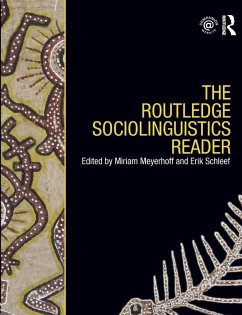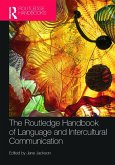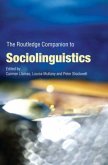Eric Schleef / Miriam Meyerhoff (Hrsg.)
The Routledge Sociolinguistics Reader
Herausgeber: Meyerhoff, Miriam; Schleef, Erik
Eric Schleef / Miriam Meyerhoff (Hrsg.)
The Routledge Sociolinguistics Reader
Herausgeber: Meyerhoff, Miriam; Schleef, Erik
- Broschiertes Buch
- Merkliste
- Auf die Merkliste
- Bewerten Bewerten
- Teilen
- Produkt teilen
- Produkterinnerung
- Produkterinnerung
Key readings in past and present sociolinguistics, accompanied by helpful comprehension questions and challenging conceptual questions plus a companion website with further exercises and study questions.
Andere Kunden interessierten sich auch für
![The Routledge Applied Linguistics Reader The Routledge Applied Linguistics Reader]() The Routledge Applied Linguistics Reader76,99 €
The Routledge Applied Linguistics Reader76,99 €![Discourse Analysis Discourse Analysis]() Rodney H. JonesDiscourse Analysis199,99 €
Rodney H. JonesDiscourse Analysis199,99 €![The Routledge Encyclopedia of Second Language Acquisition The Routledge Encyclopedia of Second Language Acquisition]() The Routledge Encyclopedia of Second Language Acquisition55,99 €
The Routledge Encyclopedia of Second Language Acquisition55,99 €![The Routledge Companion to English Language Studies The Routledge Companion to English Language Studies]() Janet MaybinThe Routledge Companion to English Language Studies167,99 €
Janet MaybinThe Routledge Companion to English Language Studies167,99 €![The Routledge Handbook of Language and Intercultural Communication The Routledge Handbook of Language and Intercultural Communication]() The Routledge Handbook of Language and Intercultural Communication99,99 €
The Routledge Handbook of Language and Intercultural Communication99,99 €![The Language and Intercultural Communication Reader The Language and Intercultural Communication Reader]() The Language and Intercultural Communication Reader70,99 €
The Language and Intercultural Communication Reader70,99 €![The Routledge Companion to Sociolinguistics The Routledge Companion to Sociolinguistics]() Carmen Llamas / Louise Mullany / Peter Stockwell (eds.)The Routledge Companion to Sociolinguistics49,99 €
Carmen Llamas / Louise Mullany / Peter Stockwell (eds.)The Routledge Companion to Sociolinguistics49,99 €-
-
-
Key readings in past and present sociolinguistics, accompanied by helpful comprehension questions and challenging conceptual questions plus a companion website with further exercises and study questions.
Hinweis: Dieser Artikel kann nur an eine deutsche Lieferadresse ausgeliefert werden.
Hinweis: Dieser Artikel kann nur an eine deutsche Lieferadresse ausgeliefert werden.
Produktdetails
- Produktdetails
- Verlag: Routledge
- 1. Auflage
- Seitenzahl: 586
- Erscheinungstermin: 17. Juni 2010
- Englisch
- Abmessung: 246mm x 189mm x 31mm
- Gewicht: 1117g
- ISBN-13: 9780415469579
- ISBN-10: 0415469570
- Artikelnr.: 28909048
- Herstellerkennzeichnung
- Books on Demand GmbH
- In de Tarpen 42
- 22848 Norderstedt
- info@bod.de
- 040 53433511
- Verlag: Routledge
- 1. Auflage
- Seitenzahl: 586
- Erscheinungstermin: 17. Juni 2010
- Englisch
- Abmessung: 246mm x 189mm x 31mm
- Gewicht: 1117g
- ISBN-13: 9780415469579
- ISBN-10: 0415469570
- Artikelnr.: 28909048
- Herstellerkennzeichnung
- Books on Demand GmbH
- In de Tarpen 42
- 22848 Norderstedt
- info@bod.de
- 040 53433511
Miriam Meyerhoff is Professor of Linguistics at the University of Auckland, New Zealand. Her work investigates language variation and the interplay between language and social identities, using qualitative and quantitative methods. She is author of Introducing Sociolinguistics, and co-editor of the Handbook of Language and Gender, as well as Social Lives in Language and the Creole Language Library. Erik Schleef is Lecturer in English Sociolinguistics in the Department of Linguistics and English Language at the University of Manchester, UK. His research interests include language variation and change, language and gender and language acquisition in immigrant contexts. He has lived and taught in the US, the UK, Germany, and Switzerland.
List of figures List of tables User's Guide to The Routledge
Sociolinguistics Reader Acknowledgements Introduction 1. Sociolinguistic
Methods For Data Collection and Interpretation Part One: Identities, Style
and Politeness Editors' Introduction to Part One 2. Back In Style:
Reworking Audience Design. Allan Bell 3. Oprah and /Ay/: Lexical Frequency,
Referee Design and Style. Jennifer Hay, Stefanie Jannedy and Norma
Mendoza-Denton 4. A Chinese Yuppie in Beijing: Phonological Variation and
The Construction of A New Professional Identity. Qing Zhang 5. Linguistic
Routines and Politeness in Greeting and Parting. John Laver 6. Formal Forms
and Discernment: Two Neglected Aspects of Universals of Linguistic
Politeness. Sachiko Ide Part Two: Perceptions and Language Attitudes
Editors' Introduction to Part Two 7. Language With An Attitude. Dennis R.
Preston 8. The Li'l Abner Syndrome: Written Representation of Speech.
Dennis R. Preston 9. Perceptual and Phonetic Experiments on American
English Dialect Identification. Thomas Purnell, William Idsardi, and John
Baugh 10. Language Education Policy and the Medium of Instruction Issue in
Post-Colonial Africa. Gibson Ferguson 11. Social Stereotypes, Personality
Traits and Regional Perceptions Displaced: Attitudes Towards The 'New'
Quotatives In The U.K. Isabelle Buchstaller Part Three: Multilingualism and
Language Contact Editors' Introduction to Part Three 12. Bilingualism in
Paraguay: Forty Years After Rubin's Study. Jinny K. Choi 13. Code Switching
In Gapun: Social and Linguistic Aspects of Language Use In A Language
Shifting Community. Don Kulick and Christopher Stroud 14. Social Meaning in
Linguistic Structure: Code-Switching In Norway. Jan Peter Blom and John J.
Gumperz 15. Dialect Contact, Focusing and Phonological Rule Complexity: The
Koineisation of Fenland English. David Britain 16. Legitimate Language in a
Multilingual School. Monica Heller 17. Language Crossing and The
Redefinition of Reality. Ben Rampton 16. The Globalisation of Vernacular
Variation. Miriam Meyerhoff and Nancy Niedzielski Part Four: Variation and
Change Editors' Introduction to Part Four 19. The Social Motivation Of A
Sound Change. William Labov 20. Well Weird, Right Dodgy, Very Strange,
Really Cool: Layering and Recycling in English Intensifiers. Rika Ito and
Sali Tagliamonte 21. Language Change Across The Lifespan. Gillian Sankoff
and Helene Blondeau 22. Norwich Revisited: Recent Linguistic Changes In An
English Urban District. Peter Trudgill 23. Aging and Gendering. Richard
Cameron Part Five: Social Class, Networks and Communities of Practice
Editors' Introduction To Part Five 24. Social Network and Social Class:
Toward An Integrated Sociolinguistic Model. Lesley Milroy and James Milroy
25. Mobility Versus Social Class In Dialect Levelling: Evidence From New
and Old Towns in England. Paul Kerswill and Ann Williams 26. Making The
Best Of 'Bad' Data: Evidence for Sociolinguistic Variation in Early Modern
English. Terttu Nevalainen 27. Vowels and Nail Polish: The Emergence of
Linguistic Style In The Preadolescent Heterosexual Marketplace. Penelope
Eckert 28. 'Doing Femininity' At Work: More Than Just Relational Practice.
Janet Holmes and Stephanie Schnurr Part Six: Gender Editors' Introduction
To Part Six 29. A Linguistic Innovation of Women in Cairo. Niloofar Haeri
30. Indexing Gender. Elinor Ochs 31. Power and the Language of Men. Scott
Fabius Kiesling 32. Markedness and Styleswitching in Performances By
African American Drag Queens. Rusty Barrett Notes on Concept Questions
Index
Sociolinguistics Reader Acknowledgements Introduction 1. Sociolinguistic
Methods For Data Collection and Interpretation Part One: Identities, Style
and Politeness Editors' Introduction to Part One 2. Back In Style:
Reworking Audience Design. Allan Bell 3. Oprah and /Ay/: Lexical Frequency,
Referee Design and Style. Jennifer Hay, Stefanie Jannedy and Norma
Mendoza-Denton 4. A Chinese Yuppie in Beijing: Phonological Variation and
The Construction of A New Professional Identity. Qing Zhang 5. Linguistic
Routines and Politeness in Greeting and Parting. John Laver 6. Formal Forms
and Discernment: Two Neglected Aspects of Universals of Linguistic
Politeness. Sachiko Ide Part Two: Perceptions and Language Attitudes
Editors' Introduction to Part Two 7. Language With An Attitude. Dennis R.
Preston 8. The Li'l Abner Syndrome: Written Representation of Speech.
Dennis R. Preston 9. Perceptual and Phonetic Experiments on American
English Dialect Identification. Thomas Purnell, William Idsardi, and John
Baugh 10. Language Education Policy and the Medium of Instruction Issue in
Post-Colonial Africa. Gibson Ferguson 11. Social Stereotypes, Personality
Traits and Regional Perceptions Displaced: Attitudes Towards The 'New'
Quotatives In The U.K. Isabelle Buchstaller Part Three: Multilingualism and
Language Contact Editors' Introduction to Part Three 12. Bilingualism in
Paraguay: Forty Years After Rubin's Study. Jinny K. Choi 13. Code Switching
In Gapun: Social and Linguistic Aspects of Language Use In A Language
Shifting Community. Don Kulick and Christopher Stroud 14. Social Meaning in
Linguistic Structure: Code-Switching In Norway. Jan Peter Blom and John J.
Gumperz 15. Dialect Contact, Focusing and Phonological Rule Complexity: The
Koineisation of Fenland English. David Britain 16. Legitimate Language in a
Multilingual School. Monica Heller 17. Language Crossing and The
Redefinition of Reality. Ben Rampton 16. The Globalisation of Vernacular
Variation. Miriam Meyerhoff and Nancy Niedzielski Part Four: Variation and
Change Editors' Introduction to Part Four 19. The Social Motivation Of A
Sound Change. William Labov 20. Well Weird, Right Dodgy, Very Strange,
Really Cool: Layering and Recycling in English Intensifiers. Rika Ito and
Sali Tagliamonte 21. Language Change Across The Lifespan. Gillian Sankoff
and Helene Blondeau 22. Norwich Revisited: Recent Linguistic Changes In An
English Urban District. Peter Trudgill 23. Aging and Gendering. Richard
Cameron Part Five: Social Class, Networks and Communities of Practice
Editors' Introduction To Part Five 24. Social Network and Social Class:
Toward An Integrated Sociolinguistic Model. Lesley Milroy and James Milroy
25. Mobility Versus Social Class In Dialect Levelling: Evidence From New
and Old Towns in England. Paul Kerswill and Ann Williams 26. Making The
Best Of 'Bad' Data: Evidence for Sociolinguistic Variation in Early Modern
English. Terttu Nevalainen 27. Vowels and Nail Polish: The Emergence of
Linguistic Style In The Preadolescent Heterosexual Marketplace. Penelope
Eckert 28. 'Doing Femininity' At Work: More Than Just Relational Practice.
Janet Holmes and Stephanie Schnurr Part Six: Gender Editors' Introduction
To Part Six 29. A Linguistic Innovation of Women in Cairo. Niloofar Haeri
30. Indexing Gender. Elinor Ochs 31. Power and the Language of Men. Scott
Fabius Kiesling 32. Markedness and Styleswitching in Performances By
African American Drag Queens. Rusty Barrett Notes on Concept Questions
Index
List of figures List of tables User's Guide to The Routledge
Sociolinguistics Reader Acknowledgements Introduction 1. Sociolinguistic
Methods For Data Collection and Interpretation Part One: Identities, Style
and Politeness Editors' Introduction to Part One 2. Back In Style:
Reworking Audience Design. Allan Bell 3. Oprah and /Ay/: Lexical Frequency,
Referee Design and Style. Jennifer Hay, Stefanie Jannedy and Norma
Mendoza-Denton 4. A Chinese Yuppie in Beijing: Phonological Variation and
The Construction of A New Professional Identity. Qing Zhang 5. Linguistic
Routines and Politeness in Greeting and Parting. John Laver 6. Formal Forms
and Discernment: Two Neglected Aspects of Universals of Linguistic
Politeness. Sachiko Ide Part Two: Perceptions and Language Attitudes
Editors' Introduction to Part Two 7. Language With An Attitude. Dennis R.
Preston 8. The Li'l Abner Syndrome: Written Representation of Speech.
Dennis R. Preston 9. Perceptual and Phonetic Experiments on American
English Dialect Identification. Thomas Purnell, William Idsardi, and John
Baugh 10. Language Education Policy and the Medium of Instruction Issue in
Post-Colonial Africa. Gibson Ferguson 11. Social Stereotypes, Personality
Traits and Regional Perceptions Displaced: Attitudes Towards The 'New'
Quotatives In The U.K. Isabelle Buchstaller Part Three: Multilingualism and
Language Contact Editors' Introduction to Part Three 12. Bilingualism in
Paraguay: Forty Years After Rubin's Study. Jinny K. Choi 13. Code Switching
In Gapun: Social and Linguistic Aspects of Language Use In A Language
Shifting Community. Don Kulick and Christopher Stroud 14. Social Meaning in
Linguistic Structure: Code-Switching In Norway. Jan Peter Blom and John J.
Gumperz 15. Dialect Contact, Focusing and Phonological Rule Complexity: The
Koineisation of Fenland English. David Britain 16. Legitimate Language in a
Multilingual School. Monica Heller 17. Language Crossing and The
Redefinition of Reality. Ben Rampton 16. The Globalisation of Vernacular
Variation. Miriam Meyerhoff and Nancy Niedzielski Part Four: Variation and
Change Editors' Introduction to Part Four 19. The Social Motivation Of A
Sound Change. William Labov 20. Well Weird, Right Dodgy, Very Strange,
Really Cool: Layering and Recycling in English Intensifiers. Rika Ito and
Sali Tagliamonte 21. Language Change Across The Lifespan. Gillian Sankoff
and Helene Blondeau 22. Norwich Revisited: Recent Linguistic Changes In An
English Urban District. Peter Trudgill 23. Aging and Gendering. Richard
Cameron Part Five: Social Class, Networks and Communities of Practice
Editors' Introduction To Part Five 24. Social Network and Social Class:
Toward An Integrated Sociolinguistic Model. Lesley Milroy and James Milroy
25. Mobility Versus Social Class In Dialect Levelling: Evidence From New
and Old Towns in England. Paul Kerswill and Ann Williams 26. Making The
Best Of 'Bad' Data: Evidence for Sociolinguistic Variation in Early Modern
English. Terttu Nevalainen 27. Vowels and Nail Polish: The Emergence of
Linguistic Style In The Preadolescent Heterosexual Marketplace. Penelope
Eckert 28. 'Doing Femininity' At Work: More Than Just Relational Practice.
Janet Holmes and Stephanie Schnurr Part Six: Gender Editors' Introduction
To Part Six 29. A Linguistic Innovation of Women in Cairo. Niloofar Haeri
30. Indexing Gender. Elinor Ochs 31. Power and the Language of Men. Scott
Fabius Kiesling 32. Markedness and Styleswitching in Performances By
African American Drag Queens. Rusty Barrett Notes on Concept Questions
Index
Sociolinguistics Reader Acknowledgements Introduction 1. Sociolinguistic
Methods For Data Collection and Interpretation Part One: Identities, Style
and Politeness Editors' Introduction to Part One 2. Back In Style:
Reworking Audience Design. Allan Bell 3. Oprah and /Ay/: Lexical Frequency,
Referee Design and Style. Jennifer Hay, Stefanie Jannedy and Norma
Mendoza-Denton 4. A Chinese Yuppie in Beijing: Phonological Variation and
The Construction of A New Professional Identity. Qing Zhang 5. Linguistic
Routines and Politeness in Greeting and Parting. John Laver 6. Formal Forms
and Discernment: Two Neglected Aspects of Universals of Linguistic
Politeness. Sachiko Ide Part Two: Perceptions and Language Attitudes
Editors' Introduction to Part Two 7. Language With An Attitude. Dennis R.
Preston 8. The Li'l Abner Syndrome: Written Representation of Speech.
Dennis R. Preston 9. Perceptual and Phonetic Experiments on American
English Dialect Identification. Thomas Purnell, William Idsardi, and John
Baugh 10. Language Education Policy and the Medium of Instruction Issue in
Post-Colonial Africa. Gibson Ferguson 11. Social Stereotypes, Personality
Traits and Regional Perceptions Displaced: Attitudes Towards The 'New'
Quotatives In The U.K. Isabelle Buchstaller Part Three: Multilingualism and
Language Contact Editors' Introduction to Part Three 12. Bilingualism in
Paraguay: Forty Years After Rubin's Study. Jinny K. Choi 13. Code Switching
In Gapun: Social and Linguistic Aspects of Language Use In A Language
Shifting Community. Don Kulick and Christopher Stroud 14. Social Meaning in
Linguistic Structure: Code-Switching In Norway. Jan Peter Blom and John J.
Gumperz 15. Dialect Contact, Focusing and Phonological Rule Complexity: The
Koineisation of Fenland English. David Britain 16. Legitimate Language in a
Multilingual School. Monica Heller 17. Language Crossing and The
Redefinition of Reality. Ben Rampton 16. The Globalisation of Vernacular
Variation. Miriam Meyerhoff and Nancy Niedzielski Part Four: Variation and
Change Editors' Introduction to Part Four 19. The Social Motivation Of A
Sound Change. William Labov 20. Well Weird, Right Dodgy, Very Strange,
Really Cool: Layering and Recycling in English Intensifiers. Rika Ito and
Sali Tagliamonte 21. Language Change Across The Lifespan. Gillian Sankoff
and Helene Blondeau 22. Norwich Revisited: Recent Linguistic Changes In An
English Urban District. Peter Trudgill 23. Aging and Gendering. Richard
Cameron Part Five: Social Class, Networks and Communities of Practice
Editors' Introduction To Part Five 24. Social Network and Social Class:
Toward An Integrated Sociolinguistic Model. Lesley Milroy and James Milroy
25. Mobility Versus Social Class In Dialect Levelling: Evidence From New
and Old Towns in England. Paul Kerswill and Ann Williams 26. Making The
Best Of 'Bad' Data: Evidence for Sociolinguistic Variation in Early Modern
English. Terttu Nevalainen 27. Vowels and Nail Polish: The Emergence of
Linguistic Style In The Preadolescent Heterosexual Marketplace. Penelope
Eckert 28. 'Doing Femininity' At Work: More Than Just Relational Practice.
Janet Holmes and Stephanie Schnurr Part Six: Gender Editors' Introduction
To Part Six 29. A Linguistic Innovation of Women in Cairo. Niloofar Haeri
30. Indexing Gender. Elinor Ochs 31. Power and the Language of Men. Scott
Fabius Kiesling 32. Markedness and Styleswitching in Performances By
African American Drag Queens. Rusty Barrett Notes on Concept Questions
Index








